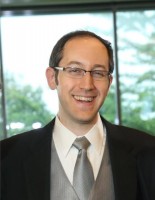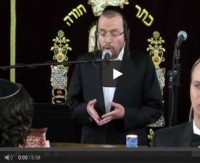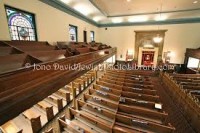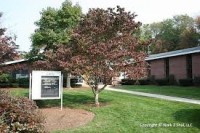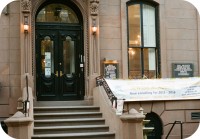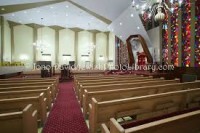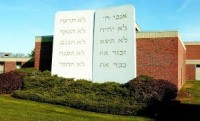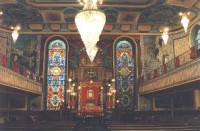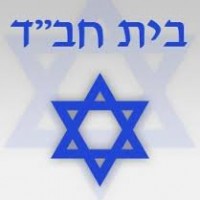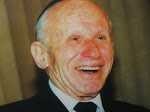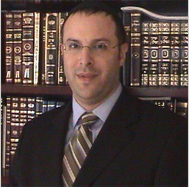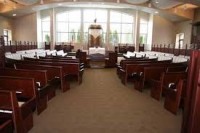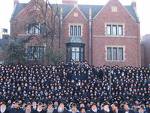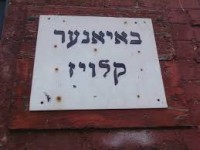Rabbi Yosie Levine joined The Jewish Center's rabbinic team in 2004. He earned a BA in English and Comparative Literature from Columbia College and was awarded the university's William F. Curtis award for outstanding oratory. A Wexner Graduate Fellow, Rabbi Levine received rabbinic ordination from the Rabbi Isaac Elchanan Theological Seminary and was the winner of RIETS' writing prize. He holds an MPA in Public Policy from NYU's Robert F. Wagner Graduate School and is currently pursuing a doctoral degree in Modern Jewish History at Yeshiva University's Bernard Revel Graduate School. Rabbi Levine served as Rabbinic Intern, Assistant Rabbi and Associate Rabbi at The Jewish Center where he received practical rabbinic training and mentoring from Rabbi Ari Berman. Before joining the Center, he served as the educational director of the Lauder Foundation's Beit Midrash in Berlin, Germany and as the visiting scholar of Congregation Knesseth Israel in Birmingham, Alabama. Rabbi Levine has taken a leadership role on the issue of day school affordability and serves as the chair of Manhattan Day School's Political Advocacy Committee. He is co-chair of the Manhattan Eruv and is active in numerous communal organizations including AIPAC and the Beth Din of America and serves on the Board of UJA-Federation of New York. Rabbi Levine's wife, Rachel, is a clinical psychologist in private practice in Manhattan. They are the proud parents of Akiva, Yehoshua, Ari and Judy.
Rabbi Dovid Zirkind, a native of Baltimore, Maryland, joined The Jewish Center clergy in July 2012. After two years of study at Yeshivat Kerem B’Yavneh in Israel, Dovid continued his education at Yeshiva University. There he received his undergraduate degree in Psychology, graduating from the Yeshiva Program with honors. Upon graduation, Rabbi Zirkind attended the Rabbi Isaac Elchanan Theological Seminary, studying in the Marcos and Adina Katz Kollel. In 2010, Rabbi Zirkind joined the Yeshiva University Torah MiTzion Beit Midrash of Toronto, where he studied full time in the Beit Midrash and served as Rabbinic Assistant at Shaarei Shomayim Congregation. In that role, Rabbi Zirkind taught classes throughout the Greater Toronto Area, crafted programs and curricula for adults, college students and children alike and trained under a number of the communities leading Rabbis.
In his role as Assistant Rabbi of The Jewish Center, Rabbi Zirkind services the full gamut of our membership. He is the director of our Adult Education program, Jewish Center University, leads our daily minyanim and heads our Young Leadership Minyan and programming. Internally, Rabbi Zirkind teaches a number of ongoing classes and shiurim, including Talmud, Contemporary Ethics and Jewish Law. He believes that passionate Torah Study should be text based, highly engaging and grapple with the major issues of our time. In the broader community, Rabbi Zirkind increasingly represents our shul as well. He is teacher at Manhattan Day School and a frequent lecturer in local institutions including; the JCC, West Side Sefardic Synagogue, Congregation Rodeph Shalom, the RIETS Rabbinic Training Seminar and others. In addition, as a UJA Federation Grant Recipient, Rabbi Zirkind currently leads the inaugural cohort of The Jewish Center Social Action Fellowship (JCSAF). Together with his wife, Ariella, the Zirkind’s lead sought after personalized marriage workshops, which include Chattan & Kallah classes and ongoing Taharat HaMishpacha and fertility counseling for young families.
Young Israel: Past, Present and Future
"The aims and purposes of the organization shall be to foster and maintain a program of spiritual, cultural, social and communal activity towards the advancement and perpetuation of traditional Torah-true Judaism; and to instill into American Jewish youth an understanding and appreciation of the high ethical and spiritual values of Judaism and demonstrate the compatibility of the ancient faith of Israel with good Americanism.
The organization shall promote cooperation among the constituent branches now existing and which may hereafter be formed, establish a close bond of kinship to the end that their individual and common problems may more easily be solved, and act as the federated and central body for the Young Israel Movement so that its influence as a force in Jewry may be felt and recognized in America and the world over."
(from the Preamble of the National Council of Young Israel Constitution)
Young Israel was born in 1912, when the primary aspirations of most American-born Jews were economic success and acceptance in American society. Jewish education was very low on their list of priorities, and as a result, was usually rudimentary, at best. Orthodox synagogues were exclusively Yiddish-speaking and permeated by an Eastern European atmosphere. American-raised Jewish youth who wandered into these synagogues typically found themselves shut out completely. It is not surprising that the Jewish youth of that era generally avoided the synagogue, attending only when expected by family custom. Although intermarriage was relatively rare, the distance between young Jewish hearts and minds and Jewish belief and practice was almost huge. It was in this environment that Young Israel was founded by a group of 15 visionary young men and women.
Its first activities were Friday night lectures in English (which was very controversial) on a variety of topics of Jewish interest. Three years later, the group formed a "Model Synagogue" with innovations designed to attract American-raised English-speaking Jewish youth, including participatory singing and youth programs. To enable people of all means to fully participate in synagogue services, Young Israel prohibited the auctioning of synagogue honors. The National Council of Young Israel required the minimum halachic standards of a mechitza, closed parking facilities on Shabbat and Yom Tov, and that each of its synagogues officers be Shomer Shabbat. Young Israel synagogues popped up across North America.
Young Israel envisioned itself as much more than a conglomeration of synagogues. Young Israel was the first on secular college campuses, with over 20 kosher dining halls and intercollegiate programs. Young Israel created an Employment Bureau for Sabbath Observers, in an era when most employees were expected to work 6 days a week. At Young Israel’s headquarters in New York, arms were packed for the Haganah defense forces of the not-yet-born State of Israel. The Free Soviet Jewry Movement was championed by the leadership of Young Israel. Young Israel has always been fiercely Zionistic, and promoted the rights of Jews to live throughout the Land of Israel. Young Israel placed an important role in gaining broad acceptance for advocating for the commuting of Jonathan Pollard’s sentence.
Today the National Council of Young Israel provides professional advice and cost-saving initiatives to 135 Young Israel synagogues (and beyond), advocates for the interests and views of our 25,000 member families, trains aspiring rabbis, supports rabbis in the field with biweekly question and answer sessions, aides communities in rabbinic searches and relations, coordinates informative Gabbai2Gabbai conference calls, provides exciting Parsha Nation curriculum for synagogue youth groups, runs inspiring Achva Summer Teen Experiences, shares best practices through monthly e-publications Shul Solutions and The Practical Pulpit, runs a three division basketball league in the New York metropolitan area, and serves as the sponsor of four senior centers at Young Israel synagogues which feed, educate and recreate the generation that made Young Israel great.
Future plans include providing spiritual inspiration and connection for Young Professionals and training Ashkenazic rabbis how to serve their Sephardic congregants. We are committed to work to maximize the resources of the Jewish community by working with our colleagues at other Jewish organizations and Jewish institutes of higher education and to maintaining a standard of excellence in everything we do.
Shacharit Mincha/Maariv
Sunday 8:30 am
Weekday 7:00 am
Friday evening sundown
Shabbos morning 9:15 am
Montefiore Orthodox Synagogue
460 Westford Street
Lowell, MA 01851
(978) 459-9400
B"H Shalom! Montefiore Synagogue (previously known as Montefiore Society Synagogue ), the oldest synagogue in Lowell, Massachusetts was established in 1896. It relocated to Westford Street in 1971, after merging with Anshe Sfard Synagogue in 1969.
Lowell, is a great place for Orthodox Jews! We have a small close-knit Jewish community dedicated to preserving and enhancing Jewish life in the Merrimack Valley region. Lowell, Massachusetts is located off the junction of Routes 3 and 495, and is conveniently located in the high-tech region of Boston Routes 128/95 and 93. Boston is just a 45-minute drive from us and New Hampshire is just 10 minutes north of us. Lowell is home to a minor league baseball team, the Spinners , and hockey team, the Lock Monsters. Lowell has quite a number of cultural and theatrical venues, the Lowell Memorial Auditorium, the Tsongas Arena, and the Merrimack Repertory Theatre to name a few.
Rabbi Ben Skydell has been the rabbi at Congregation Orach Chaim since January 2013. He follows an illustrious tradition of major American Rabbis to have served as the Congregation’s Rabbi, including Rabbis Michael D. Shmidman, Kenneth Hain and Simon Langer.
A native of Manhattan’s Upper West Side, Rabbi Skydell is a graduate of Yeshiva College and the Rabbi Isaac Elchanan Theological Seminary. He is a long-time faculty member of the North Shore Hebrew Academy High School, and the Drisha Institute for Jewish Education, and taught for several years at Yeshivat Hadar. Rabbi Skydell also served on the rabbinic staff of Congregation Beth Sholom of Lawrence, New York for nine years.
Rabbi Skydell’s areas of interest include the intersection of Halacha and history, the spiritual worlds of mussar and hasidut, and the historical world of the Rabbis of the Talmud. Rabbi Skydell’s dynamic and engaging presentation has made him a sought-out speaker on college campuses throughout the United States.
Rabbi Skydell is married to Shani, a dedicated social worker and teacher. They are the proud parents of Hannah, Emmie and Zacky.
Cantor Yaakov Y. Stark has been described as possessing “a voice of great beauty, clear and true…breathtaking, radiant, as though from another world.” A child prodigy, at the mere age of seven Yaakov Yoseph Stark was already thrilling congregations with his heartrending solos on the High Holidays. His talent and ability were nurtured by the distinguished cantors in his family, and through continuously listening to the master cantors of the golden age: Rosenblatt, Hershman, Kwartin, Pinchik, Glantz and Koussevitzky. Huge crowds of people regularly attend to savor the stirring songs and timeless tefillos eloquently enhanced and warmly delivered by their beloved cantor. Cantor Stark was privileged to perform at numerous sold-out concerts with the most prestigious philharmonic orchestras and finest choirs throughout the world. His lyric tenor voice has put him in constant demand as a guest cantor in synagogues worldwide. Cantor Stark resides in Williamsburg, Brooklyn, with his wife and children.
Rabbi Shmidman has served the Orach Chaim congregation and Upper East Side community since 1988. In addition to Rabbinic ordination, he holds a Ph.D. degree in Public Law and Government from Columbia University. He has served as Professor and Chairman of Political and Social Science at City University of New York and most recently as Dean of Undergraduate Jewish Studies at Yeshiva University. A widely recognized scholar, he is acclaimed as an outstanding teacher and inspiring preacher. An ardent Zionist, he has been honored by religious, social and cultural institutions in Israel and the United States.
Rabbi Gavriel Bellino
A native of Lower Manhattan, Rabbi Bellino grew up attending the Young Israel of Fifth Avenue, and after graduating from Ramaz, studied at Yeshivat Shalavim outside of Yerushalayim before getting his degree in Psychology, Philosophy and Women’s Studies from Brandeis University. He pursued his smicha at RIETS before returning to his childhood community in 2006 to lead the Sixteenth Street Synagogue (formerly the Young Israel of Fifth Avenue).
With the recent joining of the Sixth and Sixteenth Street communities, Rabbi Bellino now presides as the Rabbi of the largest downtown Modern Orthodox community, ready to enter a newly invigorated era of downtown Jewish life.
During his tenure as the spiritual leader of the Sixth and Sixteenth Street communities, Rabbi Bellino has established himself as a compelling and unconventional force in Orthodox Judaism.
He has worked hard to diversify approaches and experiences to make Judaism more accessible to the entire community through programs like his Foundations of Judaism class, his Tanakh Yomi initiative, and his inspiring musical havdallah service.
Rabbi Bellino’s intellectual approach is diverse and ecumenical, integrating classical midrash, early Kabbalah and Hassidut, philosophers such as Levinas and Heidegger, underrepresented Jewish thinkers like Yeshayahu Leibowitz and Avraham ben HaRambam, all alongside traditional commentators like Maimonides and Soloveitchik. His ability to draw from such a wide net and boil down complex ideas into easily digestible points is not often seen in the Orthodox world.
Rabbi Bellino works closely with other local rabbis to maintain the downtown eruv and serves as a part of the Downtown Rabbinical Council – a newly formed committee of community leaders dedicated to the Jewish revival of Lower Manhattan.
You may be able to find him at a nearby underground coffee or beer shop, or possibly at a local boxing gym. He splits his time between Teaneck and Manhattan with his wife Cori and children Choni and Keshet.
Zmanim
Alot Hashachar 5:11a
Earliest Tallit 5:42a
Netz (Sunrise) 6:32a
Latest Shema 9:20a
Zman Tefillah 10:17a
Chatzot (Midday) 12:09p
Mincha Gedola 12:37p
Mincha Ketana 3:25p
Plag HaMincha 4:36p
Shkiah (Sunset) 5:46p
Tzeit Hakochavim 6:27p
Our Hebrew School
We create and environment that brings Judaism to life, fosters creativity and supports your child's unique style of learning. We use a unique approach which is hands-on and stimulates your child's intellect. Our curriculum has been designed to make a lasting, positive impact on the life of your child.
Judaism Comes Alive
Through drama, song art and stories we bring Judaism to life. OUr innovative methods make learning fun and memorable. We teach history by showing Jewish history, a method that encourages critical thinking. Through our mitzvah curriculum we emphasize each mivtzah's meaning for everyday life, in addition to the how-to ritual observance. Our hebrew language ensures that your child will be able to read from a Siddur (prayer book) No matter what synagogue your child affiliates with later in life, she or he will share the language of prayer with Jews around the world.
Our Staff
Our Hebrew School prides itself in our staff. Staff members are imbued with a desire to impart their love and knowledge of Judaism to their students. Recognizing that Hebrew School is an academic after-school program in addition to their regular school hours, our teachers endeavor to create an engaging program that keeps the interest of the child.
Educational Philosophy
Yeshiva Academy is founded on the principles of Chabad philosophy, which is a way of life that integrates the love of G‑d, intellectual knowledge and understanding of the Torah, and the appreciation of the uniqueness of every individual of the community.
Our administration and staff implement this philosophy in all areas of Judaic and General Studies while fostering a supportive environment for all our students.
Holistic growth in academic, spiritual, moral and social/emotions domains
Rigorous academics are pursued with a recognition that our students possess a variety of learning styles and abilities.
Students are taught to apply academic lessons from their practical settings to their daily lives.
Respect for each individual unique identity and talents forms the core of enhancing our students’ sense of self.
Ethics and moral values are explicitly taught, modeled, and practiced throughout the daily life of school.
Yeshiva teachers help our students realize that the Judaic and Secular worlds are interconnected.
Faculty strives to inspire and motivate each child to enjoy learning and a accept challenges while stimulating critical thought processes.
By empowering the head, heart, and soul, a Yeshiva education provides our students with knowledge, skills and attitudes necessary to be successful and to become members of con
The Young Israel of Sharon is a vibrant orthodox shul with a warm friendly, and relaxed atmosphere. Our ideology is inclusiveness. The Young Israel of Sharon brings together men, women, and children from a wide variety of backgrounds, with a broad array of religious styles and approaches, all unified by a commitment to authentic Torah life and spirit.
Young Israel of Sharon opened its doors in 1972 with just a minyan of families. In 2001, Young Israel moved to its present day facility. Today, we are experiencing 10% annual growth and have currently reached about 200 member families.
A variety of reasons contribute to Young Israel's growth: our family-oriented community; safe neighborhood to raise kids; modern diversity and openness; and our young and vibrant members. Another reason is Sharon’s affordable housing. Business Week online listed Sharon, MA as one of the top 20 Best Affordable suburbs in the Northeast.
Young Israel exemplifies the ideals of Modern Orthodox: serious Torah study and practice, together with an embrace of diversity and participatory openness to the best of contemporary culture and community.
Rabbi Dr. Meir Sendor is the spiritual leader of the Young Israel of Sharon, MA.
He is a recognized scholar in the field of Jewish History, specifically the history of Jewish mysticism, philosophy and medicine. He holds a rabbinic ordination from Yeshiva University, a Ph.D. with Distinction from Harvard University and a Master’s from Yale University. Rabbi Sendor lectures widely on his specialties and holds many classes on various Torah topics for all levels.
Welcome to Congregation B’nai Avraham, the Orthodox synagogue in Brooklyn Heights. As the only Orthodox synagogue in the neighborhood, we serve a unique role in accommodating people with divergent religious backgrounds and at varying levels of observance. We welcome all!
Our goal is to increase the level of Jewish awareness, knowledge and observance by providing a warm, welcoming community with activities to appeal to people at all levels and with varying interests. We provide a daily morning and evening minyan and more than ten classes a week for adult learning, as well as beginner’s services and children’s services on Shabbat. Our Mei Menacham Mikvah is perhaps the most beautiful mikvah in the City.
Our membership includes both Ashkenazim and Sephardim, and our members’ first languages include Hebrew, Russian, Yiddush, French, Spanish and Arabic, as well as English. Our spiritual leader, Rabbi Aaron L. Raskin, is a member of the Chabad movement, and during services most people use the RCA ArtScroll Siddur and the Stone Chumash, although other Siddurim and Chumashim are readily available.
Come to Saturday services and enjoy a sociable kiddush afterwards, or stop by at one of our many classes, or come to a Friday night dinner with singing, joy and a guest speaker. Whether you are a yeshivah graduate, baal teshuvah, considering conversion or totally new to matters Jewish, we welcome you, and you will find a comfortable place in our vibrant community.
Daily Classes
There’s always something happening at B’nai Avraham! Every day of the week Jewish education classes are taught for free in English.
If you want to pursue your Jewish education, there are no more excuses. See our *list of classes* for more particulars. Don’t see your topic on the list? Ask us!
History
In the Summer of 1988 Stephen and Penny Rosen, having recently become more observant, wanted to establish an orthodox Shabbat minyan. Together, they contacted Rabbi Shimon Hecht of B’nai Jacob in Park Slope, who supplied them with a Torah scroll, books, and a very young man to lead services and read from the Torah. Space was rented from a local theater group, signs posted, calls made, and the hope was that someone would show up for the scheduled Rosh Hashanah and Yom Kippur services. Initially, there were the Rosens, Drs. Walter and Brenda Molofsky, previous members with the Rosens of a local Conservative Synagogue, the young man (Rabbi Aaron L. Raskin) and Rabbi Raskin’s brother Shua, who was recruited to walk from Crown Heights with the Rabbi.
Amazingly enough, other people came so that there was a minyan, and the first and only Orthodox Synagogue in Brooklyn Heights began.
After Yom Kippur, holiday and Saturday morning services were held at the Rosen’s residence for the next nine months. The Congregation was officially founded as a religious corporation in December 1988. It was named B’nai Avraham in honor of Stephen Rosen’s grandfathers, both of whom had the Hebrew name “Avraham.” Rabbi Raskin noted that “B’nai Avraham,” literally, “children of Abraham” is the name given to converts, and the Congregation has had many converts among its members. After nine months at the Rosens’, the Congregation rented a parlor floor apartment on Clinton Street. As the landlady lived upstairs, the front door had to remain locked. Generally, Stephen Rosen waited at the front door to let people in. Latecomers tossed pebbles against a window and someone would come down to let them in.
We then moved to a commercial space at 100 Clinton Street, where at long last, we could leave the door open. Finally, in 1996, we moved to our current location at 117 Remsen Street, purchased from the Brooklyn Heights Synagogue (Reform), which acquired a larger building three doors away.
In 2000, the Mei Menachem Community Mikvah was built. It is one of the most beautiful and elegant Mikvahs in the New York area.
RABBI DANIEL SHERMAN
Rabbi Daniel Sherman joined West Side Institutional Synagogue in 2013. He studied at Yeshivat HaKotel in Jerusalem and then earned a BA from Yeshiva College, where he won the award for Talmudic Excellence. He earned his rabbinic ordination at the Rabbi Isaac Elchanan Theological Seminary, where he was a Maybaum Scholar as well. Prior to recieving his semicha, he interned at Congregation BIAV in Overland Park, Kansas. Rabbi Sherman is also the Co-Director of TorahLetzion, an organization that assists motivated high school students afford a gap-year in Israel. He also spent many summers at Camp Nesher serving as the Head of Staff Beit Medrash Program, chinuch Rebbi, and Assistant Athletic Director.
CANTOR ZEV MULLER
Cantor Zev Müller, our very own "Chazzan Zevi", was raised in a house of Rabbis and Chazzanim. His father, Rabbi Aron Müller, is the Rabbi of the Jewish community in Baden, Switzerland, and his uncle is the famous Cantor Benjamin Müller of Antwerp, Belgium. Chazzan Zevi studied in the renowned Ponevezh Yeshiva in Bnei Brak, Israel, and in Beth Medrash Gavoha of Lakewood, New Jersey. Zevi received his BA in Cell Biology & Neuroscience summa cum laude from Rutgers University, and his MA in Biological Sciences from Columbia University. He is currently a graduate student at the Center for Theoretical Neuroscience at Columbia University.
Cantor Müller has studied Chazzanut and voice for many years with acclaimed cantors and opera singers, and has been leading high holiday services since the age of 18. He is a Spinto Tenor with a full range and with variations of color and dynamics. Despite his young age, Cantor Müller is well regarded in the cantorial world and is often invited to perform at concerts, officiate Chuppot and daven as a guest Chazzan around the world. In 2010, Cantor Müller recited the Kel Moleh Rachamim prayer at the UN General Assembly in commemoration of the Holocaust.
Cantor Müller has been the cantor at WSIS since 2007 and has become an integral part of the shul and the community. Though well-versed in traditional Chazzanut, Chazzan Zevi has integrated more contemporary-styled music, which encourages participatory davening and singing. Chazzan Zevi has inspired many with his warm heartfelt services and attracts many locals and visitors to the synagogue.
Besides his role as Cantor, Zevi also lectures and gives shiurim on Gemara, Jewish and Halachic topics for members of the shul and the broader community. He also finds time to teach Chazzanut, Nusach and voice to adults and children. Zevi and his wife, Chaya, live on the Upper West Side.
Young Israel: Past, Present and Future
"The aims and purposes of the organization shall be to foster and maintain a program of spiritual, cultural, social and communal activity towards the advancement and perpetuation of traditional Torah-true Judaism; and to instill into American Jewish youth an understanding and appreciation of the high ethical and spiritual values of Judaism and demonstrate the compatibility of the ancient faith of Israel with good Americanism.
The organization shall promote cooperation among the constituent branches now existing and which may hereafter be formed, establish a close bond of kinship to the end that their individual and common problems may more easily be solved, and act as the federated and central body for the Young Israel Movement so that its influence as a force in Jewry may be felt and recognized in America and the world over."
(from the Preamble of the National Council of Young Israel Constitution)
Young Israel was born in 1912, when the primary aspirations of most American-born Jews were economic success and acceptance in American society. Jewish education was very low on their list of priorities, and as a result, was usually rudimentary, at best. Orthodox synagogues were exclusively Yiddish-speaking and permeated by an Eastern European atmosphere. American-raised Jewish youth who wandered into these synagogues typically found themselves shut out completely. It is not surprising that the Jewish youth of that era generally avoided the synagogue, attending only when expected by family custom. Although intermarriage was relatively rare, the distance between young Jewish hearts and minds and Jewish belief and practice was almost huge. It was in this environment that Young Israel was founded by a group of 15 visionary young men and women.
Its first activities were Friday night lectures in English (which was very controversial) on a variety of topics of Jewish interest. Three years later, the group formed a "Model Synagogue" with innovations designed to attract American-raised English-speaking Jewish youth, including participatory singing and youth programs. To enable people of all means to fully participate in synagogue services, Young Israel prohibited the auctioning of synagogue honors. The National Council of Young Israel required the minimum halachic standards of a mechitza, closed parking facilities on Shabbat and Yom Tov, and that each of its synagogues officers be Shomer Shabbat. Young Israel synagogues popped up across North America.
Young Israel envisioned itself as much more than a conglomeration of synagogues. Young Israel was the first on secular college campuses, with over 20 kosher dining halls and intercollegiate programs. Young Israel created an Employment Bureau for Sabbath Observers, in an era when most employees were expected to work 6 days a week. At Young Israel’s headquarters in New York, arms were packed for the Haganah defense forces of the not-yet-born State of Israel. The Free Soviet Jewry Movement was championed by the leadership of Young Israel. Young Israel has always been fiercely Zionistic, and promoted the rights of Jews to live throughout the Land of Israel. Young Israel placed an important role in gaining broad acceptance for advocating for the commuting of Jonathan Pollard’s sentence.
Today the National Council of Young Israel provides professional advice and cost-saving initiatives to 135 Young Israel synagogues (and beyond), advocates for the interests and views of our 25,000 member families, trains aspiring rabbis, supports rabbis in the field with biweekly question and answer sessions, aides communities in rabbinic searches and relations, coordinates informative Gabbai2Gabbai conference calls, provides exciting Parsha Nation curriculum for synagogue youth groups, runs inspiring Achva Summer Teen Experiences, shares best practices through monthly e-publications Shul Solutions and The Practical Pulpit, runs a three division basketball league in the New York metropolitan area, and serves as the sponsor of four senior centers at Young Israel synagogues which feed, educate and recreate the generation that made Young Israel great.
Future plans include providing spiritual inspiration and connection for Young Professionals and training Ashkenazic rabbis how to serve their Sephardic congregants. We are committed to work to maximize the resources of the Jewish community by working with our colleagues at other Jewish organizations and Jewish institutes of higher education and to maintaining a standard of excellence in everything we do.
Rabbi Joshua Metzger – Executive Director
Rabbi Asher N. Webb – Kollel Director
Rabbi Levi Shmotkin – Young professionals
Rabbi Noach Heber – IAT Law and Chabad Relief NYC
Rabbi Shmuel Metzger – Upper Midtown Chabad
Mrs. Raizy Metzger – Chabad Preschool
Rabbi Yehuda Rader – Program Director
Rabbi Menachem Mendel Weisz – Assistant Rabbi
509 Fifth Ave Between 42nd and 43rd
New York City
Shachris morning service: Monday-Friday 7:45 A.M.
2nd Shachris Minyan Monday-Thursday 8:45 A.M.
Sundays (and major legal holidays) 9:30 A.M.
Mincha afternoon service: 1:45 P.M. Sunday-Friday (year- round)
Mincha/Maariv service: 4:15/4:30P.M. Sunday-Thursday
Maariv Evening Service: 5:45 p.m. Monday-Thursday
Shabbat Schedule at Chabad of Midtown Manhattan:
For Shabbat candle lighting times click here
Friday Night Service: Kabbalat Shabbat/Arvit 6:00 pm
Dinner: Following service
Shabbat Morning Service: 10:00 am
Kiddush Buffet: 12:30 pm
Weekly Shiurim:
Rav Singer Chevra Mishnayos Shiur: Daily between Mincha & Maariv
Mishna Berura Yomis: Daily after Maariv
Daf Yomi by Rabbi Fishelis: Sun – Thu at 8:00 PM
Mishlei Shiur: Sunday mornings, 7:45 AM
Women's Shiur in Tehillim: Monday
Rabbi Romm's Ha'amek Davar Shiur for men and women: Wednesday at
9 PM
Torah Topics: given by Rabbi Mayer Friedman. Friday mornings, 9:15 – 10:15 AM
Shabbos Shiurim:
Rabbi Romm–1 hour before Mincha
Daf Yomi–1 hour before Mincha
The Bialystoker Synagogue was organized in 1865 on the Lower East Side of New York City. The Synagogue began on Hester Street, moved to Orchard Street, and then ultimately to its current location on Willet Street, more recently renamed Bialystoker Place.
Our congregation is housed in a fieldstone building built in 1826 in the late Federal style. The building is made of Manhattan schist from a quarry on nearby Pitt Street. The exterior is marked by three windows over three doors framed with round arches, a low flight of brownstone steps, a low pitched pedimented roof with a lunette window and a wooden cornice. It was first designed as the Willett Street Methodist Episcopal Church.
In the corner of the women’s gallery there is a small break in the wall that leads to a ladder going up to an attic, lit by two windows. Legend has it that the synagogue was a stop on the Underground Railroad and that runaway slaves found sanctuary in this attic.
In 1905, our congregation, at that time composed chiefly of Polish immigrants from the province of Bialystok, purchased the building to serve as our synagogue. During the Great Depression, a decision was made to beautify the main sanctuary, to provide a sense of hope and inspiration to the community. The synagogue was listed as a New York City landmark on April 19, 1966. It is one of only four early-19th century fieldstone religious buildings surviving from the late Federal period in Lower Manhattan. Richard McBee and Dodi-Lee Hecht have both written in-depth articles about the building.
In 1988 the Synagogue restored the interior to its original facade, and the former Hebrew school building was renovated and reopened as The Daniel Potkorony Building. It is currently used for many educational activities. Our most recent project was the refurbishing of our windows.
The Synagogue has continued to be a vibrant and reputable force in the religious world. In recent years a substantial number of new families have chosen to make it their place for prayer and study.
Park East Synagogue is dedicated to providing the opportunity for spiritual growth, Jewish education and spiritual comfort for individuals, families, and our community.
Park East Synagogue is inclusive of all people seeking a meaningful Jewish life, regardless of degree of observance, knowledge of Jewish tradition, age, or affiliation.
Park East Synagogue is committed to providing inspiring Jewish and general studies education to children and to adults; its Religious School, Early Childhood, and Day School with its emphasis on cultivating a Jewish life rich in tradition and unrivalled in general studies has been, and continues to be, a source of character and vitality for its congregation.
The synagogue’s influence, strength and dynamism in the community derive from the members of our congregation. We value and honor the role our congregants fulfill in defining and shaping our future and that of the Jewish community, in New York City and beyond.
Shacharit
February 28 at 9:00 am EST
February 29 at 7:45 am EST
March 1 at 7:45 am EST
Mincha
February 28 at 5:40 pm EST
February 29 at 5:40 pm EST
March 1 at 5:40 pm EST
I'm not going to leave a synagogue less than a five star but I'm a little confused why I was kicked off the steps of the back entrance. I have never seen anyone come in or go out that way. I'm Jewish. There are cameras everywhere and a Police station a few doors down. They are not paticularly comfortable steps to sit on. The reason I like to sit on those steps is because it's a temple and also because it's close to Police. A few criminals are paying people to harass me every day and when I'm on those steps is the only time they leave me alone. Thanks guys
Rabbi Shaya Gansbourg, OBM, was many things to many people. A husband, a father, a grandfather. A teacher, a mentor, a good friend. A rabbi, a businessman, a world traveler. But most of all, he was a unique, special and exceedingly selfless soul. Genuine, pure, and brimming with life, Shaya was never satisfied with the status quo. He thrived on making the impossible, possible; on reaching the unreachable; on bringing to fruition that which others said could not be done. Shaya was a master of accomplishment, because he was a master of his essence – his soul. He was fully cognizant of his mission on earth as a Jew, a Chassid, a human being par excellence.
For those who knew him, it came as no surprise when Shaya announced — mid-life, when most people his age are thinking about the not-too-distant retirement funds and long-awaited vacations — that he, together with his dear wife Goldie and family, may they be blessed with long and good years, will be embarking on one of the most important and meaningful projects of his life. And thus, in one courageous instance of hope and faith, Chabad of Harlem was born.
As the Founding Father, Shaya spared no effort building Chabad of Harlem, cultivating and nurturing all he encountered. He embraced every human being who walked through the doors with the same love and devotion that he bestowed upon his very own family. Because Chabad of Harlem was his family. And will always continue to be his family.
To know Chabad of Harlem, to be a part of Chabad of Harlem in any way at all – is to know Shaya and to be deeply connected to him. He touched, inspired, and guided. He rejoiced in every happy occasion and wept along in tragedy. He loved his community. And his soul will continue to do so forever, illuminating and brightening every future interaction and experience. His legacy lives on in the proud and beautiful community he built. May his soul be a blessing for all of us.
About Us
The Old Broadway Synagogue is located at 15 Old Broadway, which is a small street that spans between 125th and 126th streets approximately half a block east of Broadway. Take the 1 train or M104 bus to 125th street and walk east to Old Broadway. We hold services every Friday at sunset, Shabbos mornings at 9:15 and Saturday afternoon 20 minutes before sunset. We have Sunday morning services followed by breakfast and a shiur with Daniel Fridman.
The Old Broadway Synagogue is the better known name of our congregation, the Chevra Talmud Torah Anshei Marovi. we were founded in 1911 in the West Harlem neighborhood of Manhattanville by a small group of Eastern European Jewish immigrants. The congregation originally met in storefronts and in the back of a bar until we built our own building in 1923 on Old Broadway. The congregation was active in the 1920s, 1930s and 1940s, but by 1950 was struggling when we hired Rabbi Jacob Kret. Together with his wife, Chana, Rabbi and Mrs. Kret brought the shul back to life by recruiting new congregants, at that point, mostly Holocaust survivors. May of these people moved on, but by this time, Rabbi Kret was a Talmud tutor at the Jewish Theological Seminary. He recruited students from JTS and later also from Columbia (he was a regular at Columbia's daily minyan and was the mashgiach in the Barnard kosher kitchen). For me Rabbi Kret embodied an ideal of Jewish authenticity: knowledgeable, observant, welcoming, warm and loving. We are doing our best to follow in his footsteps. In 2001, the shul was listed on the State and National Registers of Historic Places. We are slowly trying to restore the building and striving to be a beacon of Torah, Yiddishkeyt and Menschlikhkeyt in West Harlem.
Rabbi Moskowitz has focused much of his outreach efforts on the Jewish students at Columbia University. In recognition of his work there he was appointed as a "Religious Life Adviser" by the Office of the University Chaplain in partnership with Aish Hatorah New York. Rabbi Moskowitz has held several Aish co-sponsored events at Old Broadway and some of the students he has worked with through Aish have started to attend Old Broadway.
Following the tradition of Rabbi and Rebbetzin Kret, Rabbi and Rebbetzin Moskowitz regularly open their home and invite many Jews from the neighborhood to their Shabbos table every week. These efforts have resulted in more robust attendance every Shabbos and the understanding that Old Broadway is a happening place.
Another exciting development: the shul has been contacted by a group of Columbia staffers who work in the Manhattanville campus and who would like to have a regular Mincha minyan. The Columbia people, together with some of the Old Broadway regulars, have been meeting daily for Mincha since the beginning of December. This is the first daily minyan that has met at Old Broadway since the 1970s. The service takes place at 1:00pm Monday through Thursday at the shul and we invite you to join us. We look forward to seeing our new Mincha minyan grow.
About Beth Israel
Beth Israel Congregation was started in 1954. Two New Yorkers, purchased two storefronts on the corner of Prairie Avenue and 41st Street (currently where the Miami Beach CVS is) to begin a synagogue primarily for snow birds.
Ten years later after growing out of their storefronts, which had grown into three storefronts, the founders purchased the current location across the street, on the corner of 40th Street and Chase Avenue and began to renovate the original building to be better used as a synagogue. For decades, Beth Israel Congregation was the only Orthodox Congregation in the Miami Beach area. To this day it is the largest Orthodox congregation in Miami Beach.
In January of 2012 Beth Israel Congregation merged with the Young Israel of Miami Beach a unifying factor that speaks to the Achdut of the community. Today Beth Israel has a membership of over 230 families of all ages and different backgrounds.
Our Rabbi, Rabbi Donald Bixon, moved to Miami Beach in 1997, where he was the Young Israel of Miami Beach’s inaugural rabbi. In 2010, he was instrumental in merging the YIMB and Beth Israel Congregation, the oldest Orthodox Synagogue in Miami Beach
Rabbi Bixon’s humor and casual demeanor make him easily approachable and well liked by our congregation and community. After Yeshivat Ohr Yerushalayim in Israel he completed his undergraduate studies at Yeshiva College and Rabbinic ordination at the Rabbi Isaac Elchanon Theological Seminary where he was an Adina and Marcos Katz Kollel Fellow.
Rabbi Bixon has been dedicated to the Miami Beach community’s spiritual and physical growth. He has been active in all aspects of our community and its various institutions. Beth Israel Congregation is fortunate to have him and his wife Aliza, a Stern College Graduate, as our Rabbi and Rebbitzen.
What is Chabad at Columbia University?
· Chabad at Columbia University is a meeting place for social, educational and cultural events; a place where students seek guidance and advice on whatever issues life presents.
· A partnership between students and faculty to help create innovative programming, plan social action projects, promote awareness activities and offer volunteer opportunities.
· A home where all are welcome no matter what background or affiliation.
· Like a home, our doors never close.
· A place where every Jew is family.
· A forum where students can question faith without fear of judgment.
· A haven to turn to when a student is stressed or lonely and needs a friend to talk to — at any time of day or night.
PHILOSOPHY
Chabad at Columbia University is based on the ideology of Chabad Chassidism, which has at its foundation the encompassing mitzvah ‘to love one’s fellow as one loves oneself’ and to permeate that love with Acts of Kindness and Mitzvahs. We tirelessly deliver a universal message:
Each person is invaluable and has a direct and powerful ability to bring wholeness and peace to the world.
Chabad at Columbia University seeks to engage students at their own pace and comfort level through innovative educational and cultural programs.
PROGRAMS & SERVICES
Chabad at Columbia University has developed a reputation as an innovator of distinctive educational and social action programming.
Additionally, creative hands-on programs on campus raise community awareness, consciousness and pride. Weekly classes are given on various topics such as Mysticism and Jewish law.
Community services and events such as an interest free small loan fund for students, lending library, food drives, elderly/infirm visitation, and more.
Of course, the Rabbi and Rebbetzin are available to meet with students individually around the clock.
FUNDING
As a student, community organization, we are committed to providing our programs and services free of charge. No one is ever turned away due to lack of funds. The support for our programs comes solely from alumni, parents and friends.
FAQ
Is what you think about Chabad MYTH or FACT? You may be surprised. Take a few minutes to browse through these FAQ and you'll have a better understanding of what Chabad is all about. Click here to read some of our FAQs
Davening Schedule
Sunday AM Daf Yomi 7:45 AM
Sunday Shacharis 8:30 AM (followed by shiur and breakfast)
Daily Daf Yomi: 6:45 AM
Daily Shacharis: 7:30 AM
Rosh Chodesh: 7:15 AM
Fast Days: 7:20 AM
Evening Night Beis Medrash: 8:00 PM
M, T, W – Gemara Shiur 8:15-9:00 PM
Evening Daf Yomi: 9:00 PM
Daily Maariv: 10:00 PM
Friday Mincha: 8 minutes after Candle Lighting
Shabbos Morning Shacharis: 9:00 AM
Chabad of the Upper East Side is part of a world-wide organazation of Chabad-Lubavitch, under the leadership and guidance of the Lubavitcher Rebbe, Rabbi Menachem Mendel Schneerson.
There is no mystery about our philosophy: Love every Jew; educate every Jew; reach out to help every Jew. We open our arms and hearts to all, regardless of education or affiliation. That is a commitment that we have honored on the Upper East Side since 1993
Synagogue
Friday Evening
Mincha & Maariv:
5 minutes after candle lighting
Shabbat
9:00 AM: Chassidic Philosophy
9:30 AM: Morning Services
10:30 AM: Reading of the Torah accompanied by penetrating Chassidic insights into the Torah and it's relevance to our personal lives
Kids Shul: 10:15 AM -12:15 PM
with Mrs. Rivkah Dayan
Followed by Kiddush
Mincha, Seuda Shlishit followed by
Evening services, Havdallah and The Living Torah.
Call for exact times.
Sunday & Legal Holidays
The Upper East Side Kollel
Learning: 8:30 AM
Morning Services: 9:00 AM
followed by breakfast and 1:1* learning until 1:30 PM
Monday-Friday
The Upper East Side Kollel
6:45 1:1 Learning
7:30 AM – Morning Services
followed by breakfast and 1:1* learning until 12:30 PM
Jewish Identity Grows On Manhattan's Upper East Side
Marlene Rosenberg, a successful senior business management consultant has been living around the corner from Chabad of the Upper East Side for as long as she can remember. But it was only in the past year that she took courage and ventured in gingerly, despite her fears that the experience would be too intimidating.
“Both my parents were Jewish, but we grew up with no real knowledge or Jewish traditions,” she said. “I didn’t read Hebrew, and knew nothing about how to participate at services.” When her sister died a year ago, the loss triggered a hunger, and Marlene was on a quest for something that would bring comfort and meaning to her life.
Of the estimated 56,000 Jews who live on Manhattan’s Upper East Side—the area bounded by the East River to Central Park and 59th Street to 96th Street—only 15,000 affiliate in some way.
“The UES has one of the wealthiest, most assimilated Jewish populations anywhere,” Rabbi Benzion Krasinianski, director with his wife Chanie, of Chabad of the UES, said. “But with this many Jews who don’t affiliate at all, the need and the possibilities are tremendous.” He recalls that when he moved to the area 21 years ago to establish Chabad of the UES, many thought he’d come to the wrong neighborhood.
“People told us frankly that they didn’t see how Chabad would be relevant to Jews here who have reached the summit of success in their careers; that they would have no interest in anything spiritual.” But some like Marlene, sensitive to an existential void that begs a different kind of answer, eventually find their way to Chabad of the UES on East 77th Street and First Avenue.
Others connect when they send their children to Chabad’s popular preschool which has grown to 75 children; or to its Hebrew School where at any given time, 50 adolescents are being prepared for their bar-bat mitzvahs.
Chabad facilities here include the $13 million Schneerson Center for Jewish Life sponsored by George Rohr & Family and the Jacques & Hanna Schwalbe Mikvah sponsored by Peter Schwalbe. The building, featuring a sanctuary, classrooms, commercial kitchen and social hall bookended by a beautiful, spa-like mikvah on its below-ground level that is used by 400 women a month, and an open-air playground on the roof, is bursting at the seams.
Peter Schwalbe recalls that when “we first started building about 12 years ago, I used to say to the rabbi: ‘What if we build this spectacular building and no one shows up?’” But they now have children on a waiting list for admission to the preschool because, he says, “there’s simply no room.”
The Krasinianskis, parents of a large family, deliver a standard of programming and services that often exceeds the expectations of Upper East Siders. “The Upper East Side is a trend setting community and has repercussions around the world. If mikvah is good enough for Park Avenue women, it must be good enough for everyone,” says Chanie.
Nicknamed 7:11 for opening its doors every morning shortly before 7 and closing at 11, the Chabad center sees hundreds of Jews on an average week and more than that participating in its varied and dispersed programs and services: besides the preschool and Hebrew school, it offers well attended adult education classes, a Kollel, daily prayer services, a Friendship Circle. Under the Krasinianski’s leadership, Chabad on the UES has opened Chabad of Hunter College, Chabad Israel Center of the UES, Chabad Young Professionals, and most recently, Chabad’s Medical Outreach program.
Owing to the largest concentration of world class hospitals, including Sloan Kettering, Columbia Presbyterian, Cornell, Lenox Hill, and Mt. Sinai, the Krasinianski’s recently decided to recruit a young couple dedicated to serving this sector.
“We are often called upon by people who end up here unexpectedly, traumatized by a sudden medical crisis. They need someone to turn to, to lean on, who can help them out with medical referrals, Shabbos accommodations, sometimes with language barriers.”
In addition, Chabad’s designer thrift shop, Solomon's Wive's Designer Resale & Thrift on East 89th Street, brings people together for a good cause. Managed by Donna Pressman, who helped Mussa Zakon set up the thrift shop, the store’s proceeds go to support Chabad’s educational and social activities. The shop, says Pressman, is “where we take the material and turn it into something spiritual.”
But above all, says Rabbi Krasinianski, Chabad is here to teach Torah. “There is a real thirst—even among a more traditional element—for Chasidic study. People come back because once they’ve been exposed to the inspiration and depth that Chabad Chasidism offers, they appreciate the difference it makes in their lives.”
Long-time supporter Deborah Aronow with her husband Joseph Aronow—who recently made a generous corporate grant towards lessonsintanya.com, an online Tanya class featuring daily Tanya sessions with Rabbi Krasinianski—has known the Krasinianskis since 1992.
Although she admits that she was one of those Upper East Siders who might have thought she’d have no need for Chabad, getting to know Chabad through the Krasinianskis, who are now “family,” has taught her the timeless relevance of Torah. “There was nothing like this when I was growing up. Chabad has brought light, learning and acceptance” to Jews on the UES. “It’s not an old-fashioned thing that doesn’t apply today. Everything that you experience with Chabad has an application today.”
On a December Friday night, some 55 people—all congregants of the Reform New York Shul led by Rabbi Burt Siegel joined Chabad for Shabbat dinner. None had ever been to Chabad before, and they were curious to participate at a traditional Shabbat dinner. After the dinner, Rabbi Krasinianski opened the floor to a “stump the rabbi” session.
“They had so many serious questions; they were so engaged and interested to know more about the Torah’s perspective on a wide gamut of issues. They stayed on for hours.”
Marlene’s first exposure to Chabad, she recalls, was disarming. “They greeted me so warmly and made me feel so welcome. I felt no pressure at all.” There was a first Passover Seder, and then the High Holidays was another first. Soon she was coming more frequently, and now she’s sharing with others her newfound sense of belonging, an inspired Jewish identity, and the rich Torah content that Chabad has introduced to her life. Today, she’s at Chabad every Shabbos and takes time off of work for the rabbi’s Wednesday class.
“It’s opened a whole new world to me, both intellectually and socially. I’ve made new friends here. I’ve truly fallen in love with what I found here at Chabad.”
Minyan Times:
Shacharis Sun: 8:15 AM
Shacharis Mon/Thu: 7:15 AM
Shacharis T/W/F: 7:15 AM
Shacharis Rosh Chodesh: 15 minutes earlier than normal
Mincha: 10 minutes before Shkia
Maariv: Follows Mincha Friday
Mincha: Between 10-15 minutes before shkiah
Shabbos Shacharis: 9:00 AM in winter 9:15 in summer Shabbos
Mincha: candle lighting time Motsei Shabbos
Maariv: aproximately 50 minutes after shkiah
Daf Yomi
Monday through Friday at 6:30 am
Edit Shiur
Daf Yomi
Shabbos
(45 min. before Mincha)
Boyaner Rebbe Shlit"a Speaking at Tish commemorating the Yohrtziet of his Alter Zeide The Pachad Yitzchock of Boyan Zatza"l at Mannhatan Day School on the Upper West Side, Feb 20th 2011. Hosted by the Boyaner Shtiebel of the West Side.

